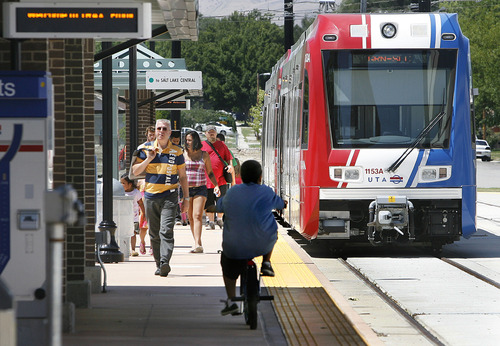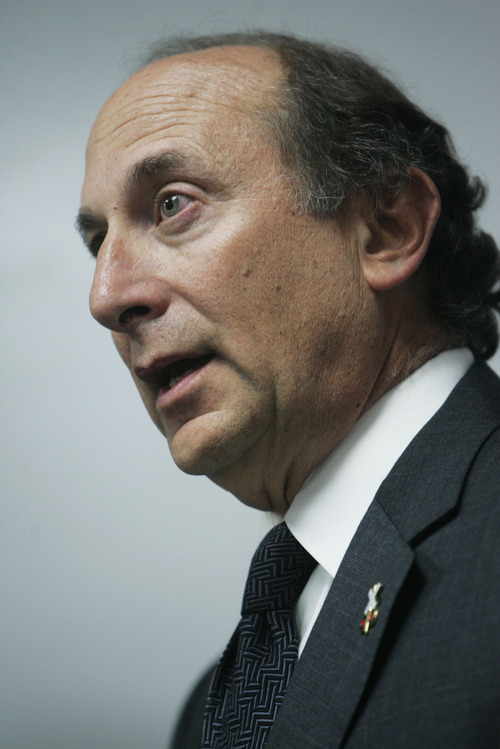This is an archived article that was published on sltrib.com in 2014, and information in the article may be outdated. It is provided only for personal research purposes and may not be reprinted.
Officials hoped Salt Lake City residents would help reduce air pollution and traffic by flocking to buy new experimental, annual transit passes offered just to them at a steep discount.
But sales of that $360 Hive Pass are underwhelming — about a third of what was expected. Just 2,008 sold as of Monday, instead of the hoped-for 6,000 or more.
"We have experimented with the first-ever residential pass program in the United States. And I would say that it may not survive," Utah Transit Authority chief Michael Allegra lamented during a meeting with bus operators at the end of May.
The Salt Lake Tribune recently watched a video of the discussion, accessed through a state open-records law request. But Allegra is backing away from that grim assessment now.
"I am optimistic the program has gained momentum since I made my comments in the meeting more than a month ago," he said in an email to The Tribune.
But city and UTA officials acknowledge poor sales while saying they are working to improve them. City officials are also encouraging UTA to give the program more time before pulling the plug.
It matters to people outside Salt Lake City, too, because Allegra says, "This is a pilot program and the future of similar programs depends on the [success of the] Hive Pass."
The pass is good for unlimited rides on TRAX, FrontRunner, UTA buses and the Sugar House streetcar. Similar all-access passes normally sell for $198 a month, or $2,376 a year. So city residents are offered more than a $2,000 annual discount.
The $360 is what UTA charges the city for each pass, so the city is passing them to residents at its cost. The city also budgeted another $108,000 a year for administration of the program, said City Council Chairman Charlie Luke.
Residents can, if they wish, purchase passes through monthly installments on utility bills. The pass is good for a year from the first time they "tap on" electronic readers.
Research into those who have bought passes shows they tend already to use UTA, or used similar passes previously, said Art Raymond, spokesman for Mayor Ralph Becker.
However, "We also have lots of people in Salt Lake City who literally have never experienced transit at any level," Raymond said.
"It's an enormous leap to get somebody who's never been on a bus or train to commit to a year's pass. Even at the very discounted rate we're able to offer, it's still $360, which we all recognize is not an inconsequential amount."
Raymond said UTA helped address that by "providing some free short-term passes that we've incorporated into our bigger marketing efforts" by giving people a taste of transit.
The city is not accustomed to selling such a product itself, Raymond said, so it teamed with UTA to work on advertising and marketing. Bus operators in the video with Allegra, however, complained many of their city riders still never have heard of the Hive pass.
The current contract allow pass sales only through August, when an initial six-month trial is scheduled to end.
But the city is negotiating with UTA to extend that window.
"We've just brought a new marketing contractor on board to help the really concentrated effort to close out our sales effort," Raymond said, adding, "Six months may not be a really worthy vetting of the potential success of this."
Luke said the city still has high hopes for the program.
"I would hate to see us cut the legs out from under it before we really have the chance to see how popular it can be," the council chairman said, noting efforts to "streamline the program and make it easier to purchase" passes.
Meanwhile, Allegra said, UTA will do all it can to boost the program in the short term with a "summer push to continue generating awareness and interest."
But the Hive Pass will need to prove itself for long-term adoption and expansion.
"In order for the program to evolve into something more permanent, it will need to create value to the city, city residents and UTA," Allegra said. "For UTA, that means attracting new riders and increasing ridership while maintaining revenue levels."





